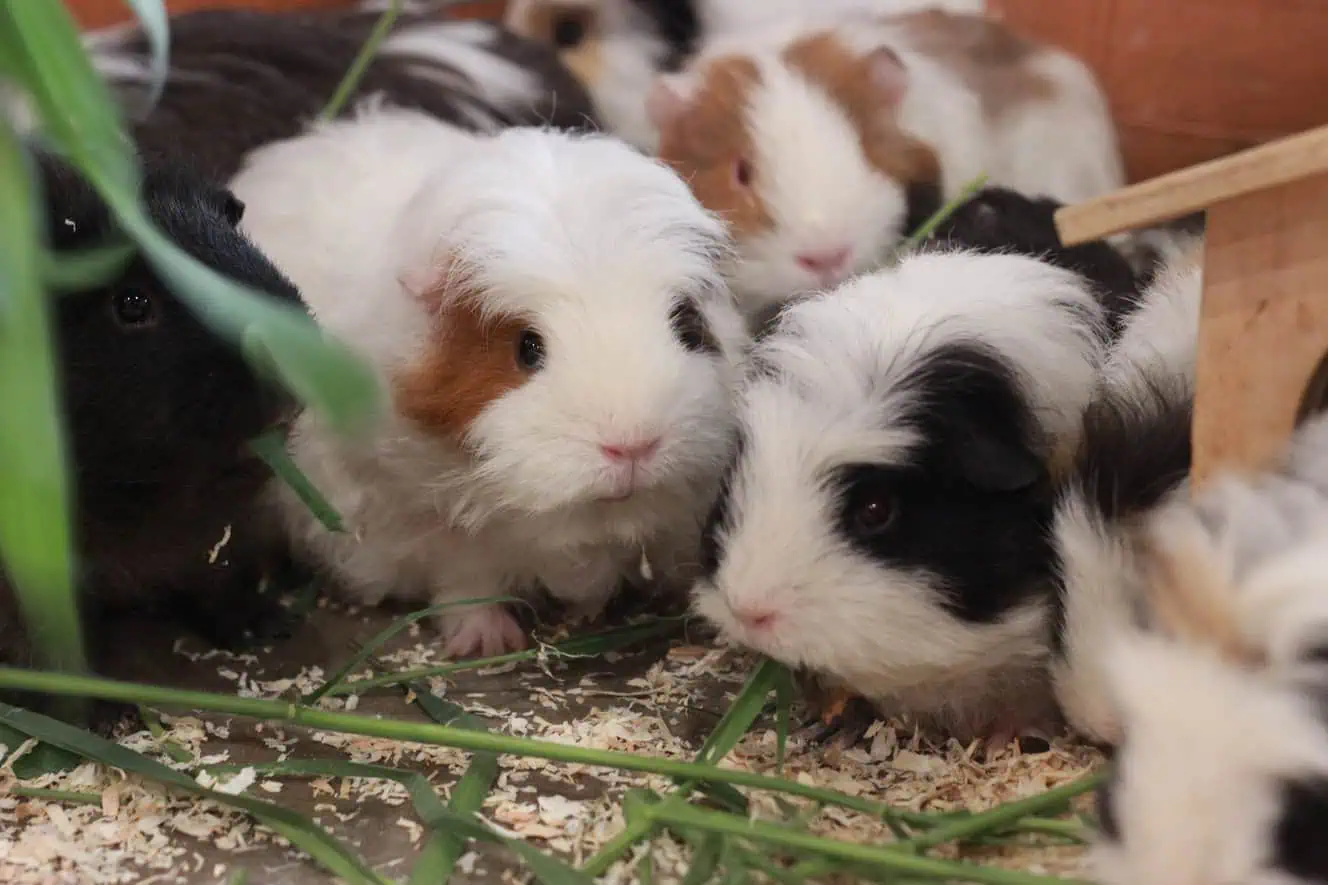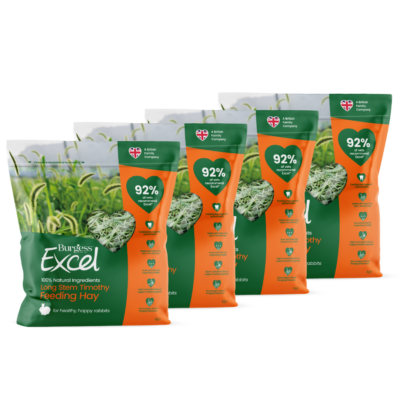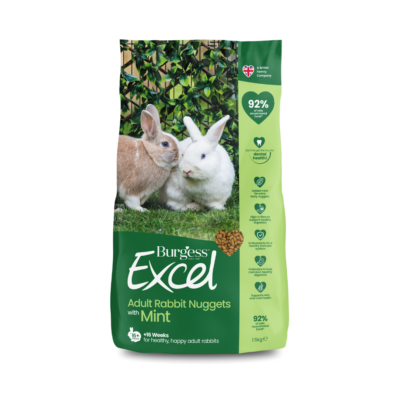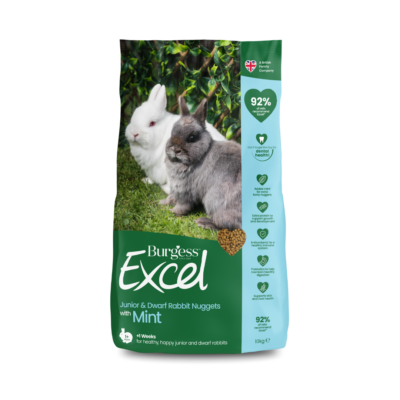
While providing your small pets with secure, accommodation that’s suitable for their species and is as large as possible is all-important, small furries also benefit from having the opportunity to explore and exercise outside their main housing in an appropriate setting.
Burgess Pet Care’s recent Small Animal Census, which surveyed 6,514 owners and 20,915 small animals, has revealed that the UK’s small pets have varying amounts of space in addition to their main housing, with 2% or rabbits having none, 16% having permanent access to a single area, 14% permanent access to multiple areas and 42% being free roaming.
For guinea pigs, 8% have no additional space, 30% have temporary access to a single area, 11% have permanent access to multiple areas and 15% are free roaming.
Access to the outdoors was also mixed. Overall, 30% of small pets had none, 12% had 1-4 hours, 7% 4-8 hours, 6% 8-12 hours, 15% 12-24 hours, and, unsurprisingly in the UK, 30% of owners surveyed stated that outdoor access per day depended on the weather.
Burgess Pet Care in-house vet Dr Suzanne Moyes MVB MRCVS comments: “To enable our small pets to live happy, fulfilling lives, it’s really important that they have species-suitable arrangements that enable them to explore and exercise in a safe space. Rabbits, guinea pigs and ferrets also benefit from enjoying time in the fresh air in good weather.”
Ensure your small pets are the lucky ones
To understand just how important extra exploration space is, put yourself in your pet’s paws for a moment. Veterinary charity PDSA says: “Your pet’s cage or enclosure should be as large as possible. Remember that this will be your pet’s toilet, dining room, bedroom and gym. Imagine how you would feel if you had to do all of these things in just one room! Aim to give your pets as much space as you can. Sadly, many small pets in the UK live in small hutches or cages without enough space to live happily. Make sure your pet is one of the lucky ones.”
As well as lots of space, all small pets benefit from having different things to do that suit their natural instincts.
PDSA adds: “It is so much fun finding out what makes your pet excited and what they love doing. Make sure your pets can never be bored and have plenty to do when they are not resting (this is just as important as play time so you will need to research where they like to rest and sleep too!). Try to think of making their cage into an adventure playground full of activities and fun things to do. The type of things they find fun depends on the species, so you will need to research to find out what is suitable for your pet.”
The charity has some great suggestions to get you started:
- Rabbits love tunnels and hides as well as access to outside runs. They should never only live in a hutch.
- Gerbils and some hamsters love to dig, and they love making tunnels out of potting compost and shredded cardboard.
- Most rodents such as hamsters, gerbils, mice, rats, guinea pigs and rabbits love to chew and enjoy shredding toilet roll inserts and other cardboard toys.
- Ferrets love toys and playing in tubs of plastic balls or dry, uncooked rice as well as lounging in hammocks.
- Chinchillas love jumping from level to level inside their cage.
- Mice, hamsters and rats love climbing ropes, ladders, swings and other obstacles.
While some small pets such as gerbils, hamsters, degus and mice are generally happiest to be left to their own devices where you can watch them having fun doing what comes naturally, others – such as rabbits, guinea pigs, chinchillas, rats and ferrets – benefit from some time out.
Let your rabbits run
Rabbits are intelligent, active animals and need plenty of room, including a safe exercise area permanently attached to their hutch or cage.
Rabbit Welfare says: “They’d also enjoy a free run of the garden or rabbit-proofed parts of the house when supervised. Cages or hutches should act as burrows to rest in as part of a larger living area. In the wild they run around for several hours every day. Rabbits can live indoors as house rabbits too. Whichever you choose, you’ll need to adapt part of the house or garden.”
Whether you’re letting your rabbits runabout indoors or outdoors, bunny-proofing is essential. PDSA adds: “Don’t forget that rabbits are brilliant escape artists, so you’ll need to create a secure environment with plenty for your rabbits to do so they don’t get bored and start testing the perimeter.”
“Indoor rabbits need at least as much space as they do outdoors,” says Rabbit Welfare. “You should keep them safe from any other pets, like cats and dogs. These are predators, no matter how friendly they might seem. Make sure your rabbits can’t chew electrical cables, or anything else that might harm them, like house plants. Your home should also be a comfortable climate. Not too hot and not too cold. And finally make sure they can’t escape when the front door is open.”
The Rabbit Awareness Action Group advises: “If you already have a hutch the best way to give your rabbits their space is to adapt it! You can build a great rabbit house yourself. They need constant access to their exercise area, like a rabbit run. An easy way to connect the two is using rabbit tunnels or a doorway, so your bunnies can hop in and out whenever they like.”
Let your guinea pigs get out and about
Regular exercise and grazing opportunities are really important for guinea pigs, who like to keep busy. RSPCA advises: “Ideally, give your guinea pigs free access to an exercise area with pipes and shelters to encourage exercising. They're active animals and need opportunities to run, stand fully upright on their back legs and stretch out when lying down.”
“Guinea pigs are very active animals, and they need lots of space as well as plenty of toys, hides and tunnels to keep them healthy and happy. If your guinea pigs don’t have the right home it can lead to boredom and health problems,” says PDSA. “There are lots of different ways you can make the perfect set up for your guinea pigs. A large hutch and a big exercise area provide them with the ideal living area, a cosy bedroom to snuggle up in and plenty of room to run around and explore.”
Animal wellbeing charity Blue Cross adds: “Whether your guinea pigs are housed inside or outside, they need the opportunity to run around and explore. If your guinea pigs live inside and you have a garden, then they can still go outside in a run on warm days. Guinea pigs need to graze regularly and access to grass will allow them to do this. If the run isn’t connected to their housing, make sure they have a shelter they can access easily. Guinea pigs are low to the ground so will become damp and cold on grass that is wet. If your indoor guinea pigs won’t be able to access outside space, then they will need access to a space no less then 6ft x 4ft (or 24 square feet) for exercise. They can be allowed to run free indoors under supervision. Make sure all doors are closed, there are no escape holes, and that cats and dogs are kept out of the room.”
Discover the secret to healthy, happy guinea pigs >>
Let your ferrets enjoy fun times
Endlessly inquisitive ferrets will thrive on time out – but close supervision is most definitely required!
“Ferrets should have daily exercise either in the house or in a large run,” says Blue Cross. “If your ferret is allowed loose in the house make sure you remove any potentially dangerous objects first. Ferrets aren’t natural chewers but do like to put objects in their mouths and they can eat things they shouldn’t. This means they may swallow small objects (especially rubber) which cause their bowel to become blocked.”
The charity also notes that, because ferrets like to sleep in dark and enclosed places, it’s essential to check washing machines, tumble dryers and cupboards before closing or using them.
Some ferrets may even enjoy going for walks with you. “You'll need to spend time introducing them to their harness and lead and getting them used to the experience,” advises Blue Cross. You’ll need a secure harness that they can’t wriggle out of and to keep a close eye on them at all times. The charity recommends: “You should avoid public places if they aren't used to being picked up or meeting new people. Watch out for dogs and pick your ferret up if you can see a dog in the distance – it's always better to be safe.”
The ultimate guide to happy, healthy ferrets >>
Let your chinchillas have the chance to let off some steam
Active and agile chinchillas need time out of their accommodation every day so they can have a good runaround – and impress you with their incredible jumping feats.
Blue Cross advises: “Chinchillas should be allowed out for supervised exercise in a safe, contained environment as much as possible and at least once a day. Chinchillas are most active in the early evening, so this is a good time to get them out for a run.”
Supervision is essential to ensure your chins don’t get up to mischief. Blue Cross recommends: “Make sure they’re supervised because they like to explore everything with their teeth. You don't want them chewing through electrical wires. Before you can let your chinchilla run around the house, you need to be confident that they will allow you to handle them so you can return them to their cage.”
The ultimate guide to happy, chilled chinchillas >>
Let your rats go free range
Super smart rats will astonish you with their out-of-cage antics.
“Once your rats have bonded with you and settled into a routine, you can start to allow them free range time in a rat-safe room, advises Wood Green. “For example, a spare bedroom with small amounts of safe furniture and activities like agility items for them to explore. This is also a great opportunity for you to socialise with and train them.”
Keeping a close eye and ensuring there are no hazards such as electrical wires, toxic house plants, air fresheners or escape routes is a pet rat essential. Blue Cross says: “Rats are busy bees and they’re happiest when they’re on the go. They look forward to playtime, so it’s important that you give them at least an hour outside their cage every day so they can stretch their legs and do some serious exploring (make sure the room is safe and rat-proof first though – rats are also skilled escape artists!).”
The ultimate happy pet rat guide >>
ONLY THE BEST FOR OUR SMALL PETS!
At Burgess, all our foods for small pets is made at our factory in the heart of Yorkshire, using only ingredients that meet our stringent specifications. With a long tradition of supporting British famers, we actively source all our ingredients as close to our mill as possible.
It’s no surprise that 92% of UK vets recommend our Burgess Excel small pets range!
- Check out our tasty nugget varieties specially created for junior and dwarf rabbits, indoor bunnies, golden oldies, adult rabbits – there’s even a light recipe for buns who are watching their weight!
- All Burgess Excel guinea pig nuggets, feeding hay and healthy treats are made with the finest ingredients that meet our stringent specifications and homegrown grass that’s exclusive to Burgess – no other pet food manufacturer has access to our grass!
- Burgess Excel has also developed nutrition-packed food for chinchillas and degus, hamsters, gerbils and mice, pet rats and ferrets.
And, with a fantastically nibbly range of healthy snacks available, there are all sorts of 100% natural, tasty treats to reward your small pets!
Are your small pets Burgess small pets? Join the Burgess Pet Club for exclusive offers and rewards.
12 fascinating facts you may not know about Burgess Pet Care! >>
CARE MORE Find lots of useful advice on caring for all your pets from Burgess, the pet experts. Training, nutrition, grooming and general care. It’s all here >>
If you found this interesting, you may also like:
COST EFFECTIVE WAYS TO LOOK AFTER YOUR SMALL PETS How to create DIY boredom breakers and ways to upcycle old furniture and unwanted items from around the house into interesting features for your pets’ environment.
RABBITS AND GUINEA PIGS – IS INDOORS OR OUTDOORS BEST? Is the outdoor life better for bunnies and guinea pigs, or will these small pets have a more enriching time if they’re kept indoors?
HOW DO YOU CREATE AN IDEAL HOME FOR YOUR INDOOR GUINEA PIGS? However cosy and stylish your indoor piggies’ home is, it also needs to meet all their health and wellbeing requirements.
HOW MUCH SPACE DO YOUR RABBITS NEED? If you have a couple, a throuple or even a band of well-bonded bunnies, you’ll know just how much they love hanging out together. However, even the best bunny pals need their own space and a roomy, enriching environment.
WHICH SMALL PET IS RIGHT FOR YOU? Small pets come in all different shapes, sizes and species, so it’s no surprise that choosing the right addition to your family is far from easy. We’ve lots of advice to help you make the best decision...
BIG IDEAS FOR SMALL PETS As well as providing the right nutrition, suitable accommodation and company of their own kind, enrichment is just as important for our small pets. But what exactly is it?
WHAT’S IN SEASON? HOW TO CHOOSE SAFE FRESH FOOD FOR YOUR SMALL PETS What better way to add variety to your small pets’ daily dinners than by selecting safe fruits, vegetables and leafy greens to nibble on. To save a few pennies, you could even forage for some tasty titbits yourself or why not grow your own?
ESSENTIAL HEALTH CHECKS FOR SMALL PETS Our small pets such as guinea pigs, chinchillas, rats, gerbils, hamsters and degus need us to keep a constant close eye on their health and wellbeing. But do you know what to look for?
NUTRITIOUS NUGGETS – WHY THEY’RE THE BEST CHOICE FOR OUR SMALL PETS Muesli-style foods may seem like a healthy option for small pets, but this is actually not the case. Find out why nuggets are the best option when it comes to feeding your small furries...
FINDING A VET FOR YOUR SMALL PETS Did you know that just like hospital specialists, vets have different areas of expertise? That’s why, if you have small pets, it can be a good idea to seek out a vet that specialises in small animal medicine.
AND SO, TO SLEEP… Are hamsters nocturnal? Do guinea pigs spend more time awake or asleep? Are degus awake in the day? Do chinchillas sleep upside down? Do rats only come out at night? Some of our small pets’ sleeping habits seem a little odd to us, but there are some very good reasons why their snoozing patterns are different to ours, which are really rather fascinating...
HOW TO TELL IF YOU HAVE A HAPPY PET Wheek-wheeking, bruxing, dooking, chirping, binkying, popcorning – there are all sorts of ways our pets tell us they’re feeling good, once you know what to look for...
WILD AT HEART Many generations ago, the ancestors of our small pets lived in the wild. Understanding how their wild relations live can help us meet our small pets’ needs so they have the right environment, company and nutrition to thrive.
NEW PETS ON THE BLOCK? From dogs to degus, hamsters to gerbils, cats to chinchillas, ferrets to fancy rats – when did these awesome and amazing animals become our furry companions?

















